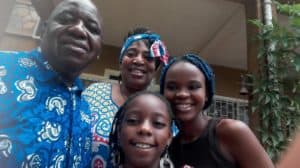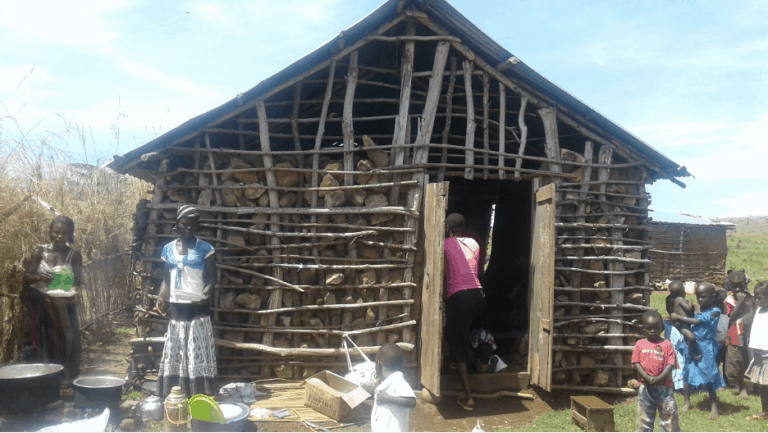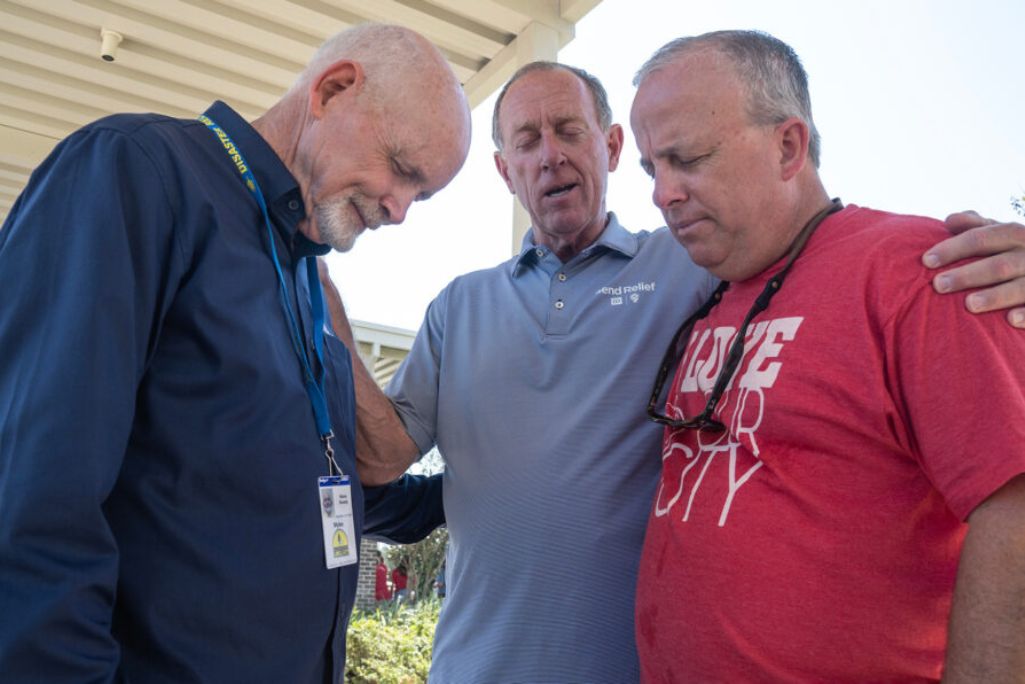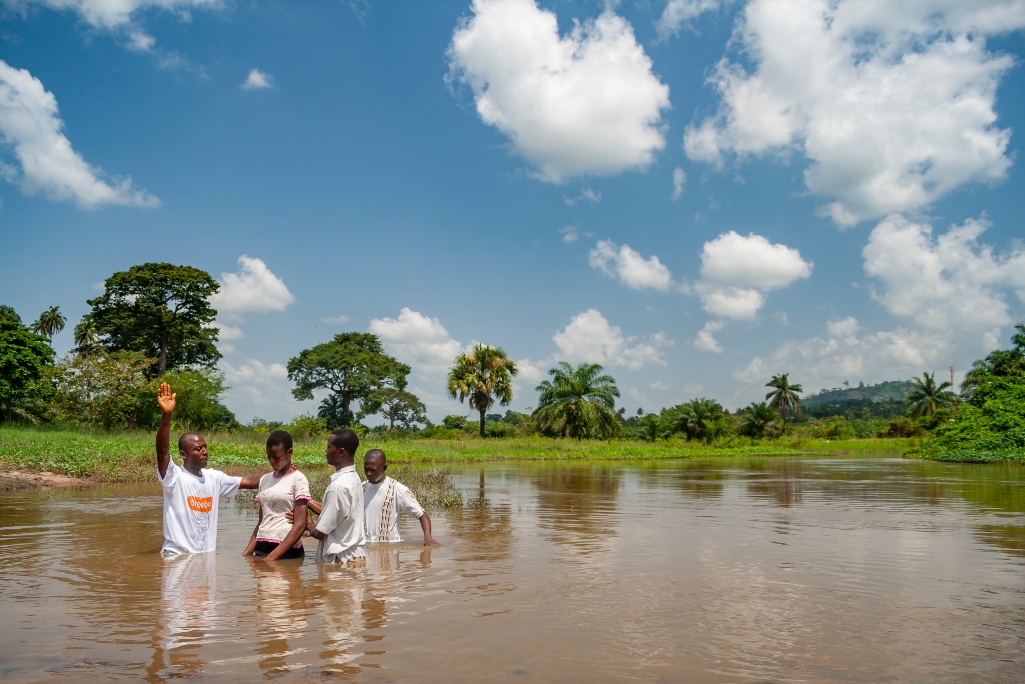
James and Sonya Herron with daughter Madison, foreground, and “unofficial” daughter Babra, right.
When the COVID-19 pandemic shut down much of the world, residents of remote islands in Lake Victoria got the latest news from the village loudspeaker. One pastor seized the opportunity to preach over that loudspeaker twice a week, to around 700 people within earshot.
A Muslim man who heard the sermons told the pastor not to come back to him with the gospel again. But the pastor kept preaching, and the man kept listening. Eventually, he came back.
“I want your God,” he said. “I want your Jesus.”
James and Sonya Herron have served with the International Mission Board (IMB) in Uganda for 11 years. They have seen 15 churches started on seven islands. They have seen unbelievers like the Muslim man transformed by the gospel. The Herrons and their fellow Christians on the islands preach one true God in a land of many “little gods,” James said.
“Africans, they know there’s a God,” he said, adding that spiritual concepts like good and evil are woven into the culture. They’re open to the gospel.
“The thing is to get people to turn from their old ways, and to fully engulf and fully receive and allow Christ to change their lives,” he said.
As members of First Baptist Church in O’Fallon, Ill., the Herrons went on mission trips to Africa for years before relocating full time to Uganda. James served on the Illinois Baptist State Association’s church planting team, helping facilitate new African American and African congregations in Metro East Illinois.

Women prepare lunch at a Baptist church in the islands.
They moved to Uganda in 2010 to help start new churches and disciple believers. Over more than a decade, they have facilitated medical clinics, Vacation Bible Schools, training programs for farmers and other initiatives to point people to the gospel.
The Herrons spent their first five years in Uganda sleeping in tents. (They now live on a compound with their daughter Madison.) They had their first stateside assignment back in the U.S. in 2014, and when they got back to Uganda, people were surprised to see them.
“They were happy, but they were surprised we had come back to them,” James said.
Life is hard in the region. Island self-esteem is low. The average income of most people they work with is less than $300 a year. Life is less expensive on the islands, but the people they serve are considered expendable, underserved by the government and everyone else.
“We told them this is where God sent us,” James said, “and we’ll be here until He moves us.”
Spiritually, Sonya said, it’s easy for the people they work with to accept that there is another God active in the world, but they may take Jesus and add Him to their other beliefs.
“Even those in the church, those who say they have accepted Jesus Christ as their Lord and Savior, for many of them it is what we consider hedging your bets,” she said. “You have to untease the true and living God from what they believe and what they understand about the power and the importance of gods in their lives.”
The Herrons have found a hearing for the gospel on the islands, including among Muslims. They’re even welcome to share in local schools, Sonya said. The believers they work with are quick to share Jesus with others, but the larger challenge is helping them shore up what they believe and why they believe it. Toward that end, James teaches the Baptist Faith and Message, Southern Baptists’ statement of faith.
The lessons are helping believers refute false teaching, James Herron said. He recounted how a Ugandan church member recently encountered a false teacher. The church member was able to point out that the scripture the teacher was using was being taken out of context.
“I believe that we’re seeing people making drastic changes in their presentation of the gospel and what they’re preaching,” James said. In one three-month period this year, five Muslim men came to know the Lord.
James said their desire is for people to love Jesus to the point that when they see inconsistencies between the gospel and their traditional beliefs, they abandon the tradition and hold onto Christ.
The isolated islands have not been immune to COVID-19 and restrictions to prevent its spread. Officials instituted a shutdown immediately following the first case in the country, resulting in even more difficult circumstances for many, Sonya said. Not only were families of six or eight confined to a small hut, but they were unable to shop for food on their way home from work as they normally would. In a culture where you use your daily wage to buy food for that evening, people were hungry.
The Herrons had access to funds to provide emergency food for some of the pastors and churches. In one congregation, everyone took smaller portions so that the food would stretch further.
“To me, that’s the church being the church,” James said.
The couple has been back in Illinois on stateside assignment since the summer but plans to return to Uganda in January. In their absence, the work has continued through local pastors and the work of Austin Lee, an IMB Journeyman also from FBC O’Fallon.
When they get back, James said, they will pick back up on training from the Baptist Faith and Message. They will continue to disciple new believers who may leave their islands one day. After all, James said, fishermen follow the fish.
“As long as they are carrying Christ with them,” he said, “that’s what we want to happen.”
(EDITOR’S NOTE – Meredith Flynn is a writer for Illinois Baptist, newspaper for the Illinois State Baptist Association.)


